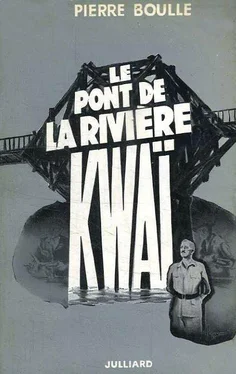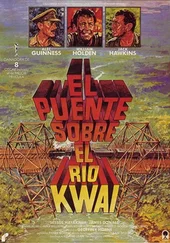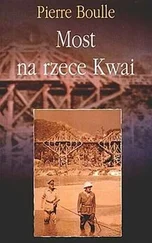The first to make contact were some privates who could not speak a word of any civilized language. Colonel Nicholson had not budged. Then an N.C.O. had driven up in a truck and motioned the British to load their arms onto the vehicle. The Colonel had forbidden his men to move. He had demanded to see a senior officer. There was no officer, either senior or junior, and the Japanese did not understand his request. They had turned nasty. The soldiers had assumed a threatening attitude, while the N.C.O. broke out into shrill screams and pointed at the rifles. The colonel had ordered his men to stay put and not move. Submachine guns had been pointed at them, while the colonel was unceremoniously pushed around. He had kept his temper and repeated his demand. The British began to look rather worried and Clipton was wondering if the C.O. intended to get them all massacred out of loyalty to his principles and for the sake of form, when a car full of Japanese officers at last appeared. One of them wore the badge of rank of a major. Faute de mieux, Colonel Nicholson decided to surrender to him. He called his unit to attention. He himself saluted in exemplary fashion and, taking his holster off his belt, presented it with a flourish.
Faced with this gift, the astonished major first stepped back in alarm; then he appeared extremely embarrassed; finally he became convulsed by a long burst of savage laughter in which he was soon joined by his fellow officers. Colonel Nicholson simply shrugged his shoulders and assumed a haughty expression: nonetheless, he gave his men the order to load their rifles onto the truck.
During the time that he had spent in the prison camp near Singapore, Colonel Nicholson had made a point of observing a strict Anglo-Saxon code of behavior in face of the enemy’s disorderly conduct. Clipton, who had been with him all the time, was not sure even at that early date whether to bless him or curse him.
As a result of the orders he had issued, orders which confirmed and amplified the Japanese instructions, the men in his unit behaved well and fared badly. Bully beef and other miscellaneous supplies, which the prisoners from other units sometimes managed to “win” in the blitzed outskirts of Singapore in spite of, and often in connivance with, the sentries, were a welcome supplement to the meager rations. But this sort of looting was not permitted on any account by Colonel Nicholson. He made his officers give lectures condemning such behavior as undignified and pointing out that the only way for the British soldier to command the respect of his temporary masters was to set them an example of irreproachable conduct. He saw to it that this order was obeyed by carrying out regular inspections, which were even more thorough than the sentries!
These lectures on the standard of behavior which every soldier was supposed to keep up when serving overseas were not the only fatigues which he imposed on his battalion. During that period the unit was by no means overwhelmed with work, since the Japanese had organized no labor to speak of in the outskirts of Singapore. Convinced that idleness was prejudicial to the spirit of the regiment, and frightened at the prospect of a drop in morale, the Colonel had drawn up a full program for every off-duty hour. He made his officers read out and explain to the men whole sections of King Regulations, after which he examined them and issued rewards in the shape of certificates bearing his signature. Discipline, of course, was not the least important subject in this curriculum. At regular intervals it was brought to the notice of all ranks that correct saluting was compulsory, even in a prison compound. Consequently the privates, who were also obliged to salute every Japanese, irrespective of his rank, ran a double risk every time they neglected instructions: on the one hand, they risked the kicks and blows of the sentries; on the other, a dressing down from the Colonel and some punishment imposed by him, such as having to stand at attention for several hours during recreation periods.
The fact that such Spartan discipline had been generally accepted by the men, and that they had voluntarily submitted to an authority which was no longer backed up by the powers-that-be, but was only wielded by an individual at the mercy of the same abuses and ill-treatment as themselves, was a frequent source of amazement to Clipton. He often wondered whether such obedience should be attributed to the personal respect which the Colonel commanded or to the privileges which they enjoyed thanks to him; for no one could deny that his intransigent attitude was successful, even with the Japanese. His chief weapons, when dealing with them, were his insistence on a proper code of conduct, his tenacity, his ability to keep harping on one particular point until he obtained satisfaction, and the Manual of Military Law containing the Hague Convention which he calmly waved in the Japs’ faces each time a breach of international law was committed. His personal courage and complete disregard for the blows he received were also no doubt largely responsible for the high regard in which he was held. On several occasions, when the Japanese had exceeded the recognized rights due to a victorious army, he had done more than protest. He had personally intervened. He had once been badly beaten up by a particularly brutal guard who had issued an order contrary to international law. He had eventually scored his point, and his assailant had been punished. He had then proceeded to issue his own version of the order, which was far harsher than anything the Japanese could devise.
“The main thing,” he explained, when Clipton suggested that in the circumstances he might exercise a little leniency, “the main thing is to make the lads feel they’re still being commanded by us and not by these baboons. As long as they cling to this idea, they’ll be soldiers, not slaves.”
Clipton, who could see both sides of the question, had to admit there was something to be said for this and realized that the Colonel’s action was prompted, as usual, by his sterling qualities.
The prisoners now recalled those months they had spent in the Singapore camp as a period of balmy days, and sighed with regret when they compared it with their present plight in this uncivilized corner of Siam. They had reached their destination after an endless train journey right across Malaya, followed by an exhausting march, in the course of which they had grown so weak from exposure and malnutrition that bit by bit they had jettisoned the heaviest and most valuable items of their wretched equipment, without any hope of ever getting them back. The rumors about the railway they were going to build did not cheer them up at all.
Colonel Nicholson and his unit had been moved a little later than the others, and the work was already under way by the time they reached Siam. After the hardships of their cross-country march, their first encounter with the new Japanese authorities had been far from encouraging. At Singapore they had been up against soldiers who, after the initial frenzy of victory, and apart from a few isolated outbreaks of primitive brutality, had proved to be not much more oppressive than any Western army of occupation would have been. The officers in charge of the Allied prisoners on the railway were evidently quite a different proposition. From the very start they had acted like chain-gang warders and were liable to turn at a moment’s notice into sadistic executioners.
Colonel Nicholson and the remainder of his battalion, which he still prided himself on commanding, had at first been transferred to a vast reception center serving as a transit camp for all the convoys along this route, part of which, however, was already in use as permanent quarters. They had stayed there only a short time, but long enough to realize what they were in for and how they would live until the job was finished. The poor devils were put to work like beasts of burden. Each of them had to complete a task which was not perhaps beyond the strength of a man in good condition and on an adequate diet, but which, for the pitiful, emaciated creatures they had become in less than one month, was a job that kept them busy from dawn till dusk and sometimes half the night. They were worn out and demoralized by the curses and blows which the guards rained down on them at the slightest sign of faltering, and haunted by the fear of even worse punishment to come. Clipton had been appalled by their physical condition. Malaria, dysentery , beri-beri , and jungle sores were rife, and the camp Medical Officer had told him there might be far more serious epidemics, against which he could take no precautions at all. Not even the most rudimentary medical stores were available.
Читать дальше











